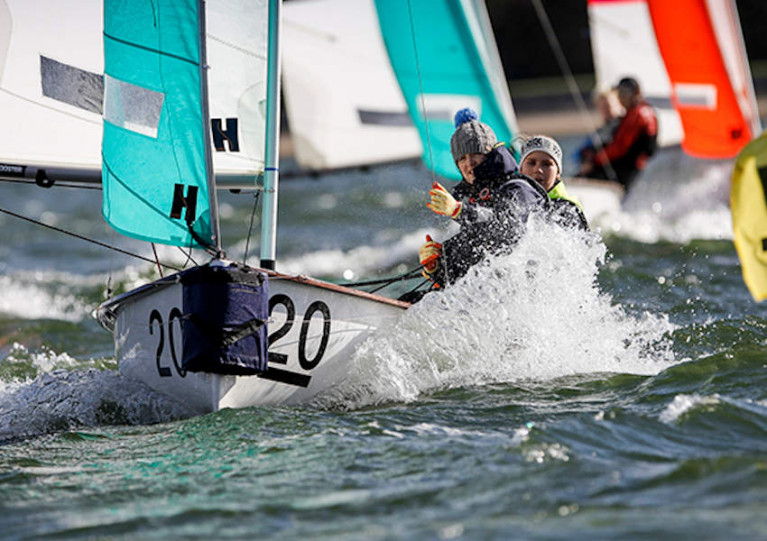Displaying items by tag: Eric Twiname
Save the dates for 2023’s Eric Twiname Junior & Youth Team Racing Championships which will be held over the weekend of 7-8 October at Oxford Sailing Club on Farmoor Reservoir.
Young sailors aged eight to 18 across Great Britain and Northern Ireland will soon be invited to join the junior team racing event of the year.
Whether registering individually or as part of their junior and youth class associations or sailing club teams, this is the perfect opportunity to showcase their skills and engage in friendly competition.
With a maximum of 24 youth and 48 junior teams, the championships promise an exciting racing calendar highlight.
Unlike traditional fleet racing regattas, this event features groups of young sailors sharing RS Feva and Firefly dinghies, executing on-water changeovers in thrilling three-on-three competitions in Fireflies for the youth category, and two-on-two contests in Fevas for the junior category.
To ensure a more suitable level of competition, this year’s championships will also introduce age-group categories. The Youth category in Fireflies is for those under 19, while the Junior category in Fevas will be split into U17 and U15. However, U17 participants can still opt to compete in the Youth fleet and under 15s have the chance to sail with 15- or 16-year-olds in the U17 Junior fleet.
Sign-ups will be opening soon. For further details get in touch with [email protected].
Nine young sailors from Northern Ireland travelled to England last weekend to compete in the Eric Twiname 2022 Championships at Rutland Sailing Club in the East Midlands.
The first Eric Twiname event took place in 1986 and has seen thousands of young sailors, including Olympians past and present take part. Sailing stars Ben Ainslie and Iain Percy were among the early winners of the regatta before going on to Olympic greatness.
The regatta took place on the 3000-acre Rutland Water and is named in memory of legendary sailor, author and journalist Eric Twiname. It is regarded by many young racers as a rite of passage as they continue their journey to become top-level competitors.
Twiname made his name in sailing, winning numerous national titles in a range of dinghy classes, as well as in team racing where he captained the British Universities Sailing Association.
 Daniel Palmer of Ballyholme YC - 4th overall in the ILCA 4
Daniel Palmer of Ballyholme YC - 4th overall in the ILCA 4
Northern Ireland had six compete in the huge 110 strong Topper 5.3 fleet over five races and best performer was Bobby Driscoll of Royal North and Ballyholme Yacht Clubs on Belfast Lough. He came fifth overall with results never above ninth. His best placing was a third.
Autumn Halliday of Strangford Lough YC and Ballyholme clocked a seventh as her best result finishing in 27th place. She was closely followed by Cormac Byrne from Strangford Sailing Club and Ballyholme whose best placings were two ninths. Also competing were Emily McAfee, Isabelle Nixon, and Hugo Boyd also of Ballyholme
In the ILCA4 fifty-five strong fleet were Daniel Palmer of Royal North and BYC who finished in an excellent fourth slot with a third in the last race. In that fleet also was Callum Jackson from Coleraine and Portrush on the North Coast and Lucy Ives from the opposite end of the region, Carlingford Lough Yacht Club on the South Down coast.
RYA Northern Ireland posted on Facebook “ Some great results and lessons learned by all. No time to rest though as we are back training next weekend with our Youth Performance Topper Sailors”.
Eric Twiname Team Racing Championships Cancelled
The 2020 Eric Twiname Youth & Junior Team Racing Championships, which had been rescheduled for this October, have now been cancelled.
Organisers the RYA and Eric Twiname Trust took the “difficult decision” to call off the event in agreement that it could not be delivered safely in light of current coronavirus restrictions.
The regatta was due to take place on 10-11 October at Farmoor Reservoir in Oxfordshire.
Unlike conventional fleet racing regattas, the Eric Twiname sees groups of young sailors sharing RS Feva and Firefly dinghies, carrying out on-water changeovers using support RIBs and often being in close proximity to one another ashore.
It also requires a high number of support staff and volunteers, as well as attracting a large amount of spectators to the site.
These factors led to the decision to cancel the 2020 event and instead focus on 2021.
However, the RYA says it has reaffirmed its intention to run the Regional Junior Championships on 26-27 September and the revised Youth National Championships from 24-27 October.
Chris Atherton, RYA national performance manager, said: “Although we obviously make this decision to cancel the Eric Twiname Team Racing Championships with a heavy heart, we believe it is the correct decision to protect everyone’s safety.
“The number of people involved and the logistics to achieve racing just wouldn’t allow it.
“Our great thanks go to Oxford Sailing Club who have been wonderful supporters of this event, helping to make it the success it is today. They have been very understanding in the current circumstances and we look forward to the event returning to Farmoor in the future.”
Bruce Aitken, secretary at The Eric Twiname Trust, added: “The general consensus among trustees is that, unlike ‘conventional’ racing, team racing poses far more challenges in the context of safeguarding competitors and organisers from the risks associated with Covid-19.
“We all want to encourage youth and junior sailing and racing safely is a big part of that, but we feel in these extraordinary times it would be better to cancel this event and return next year in a true reflection of what this event is and should be.”
Last year’s event took place at Rutland Water Sailing Club in England’s East Midlands, where Northern Ireland sailors enjoyed a strong showing.






























































